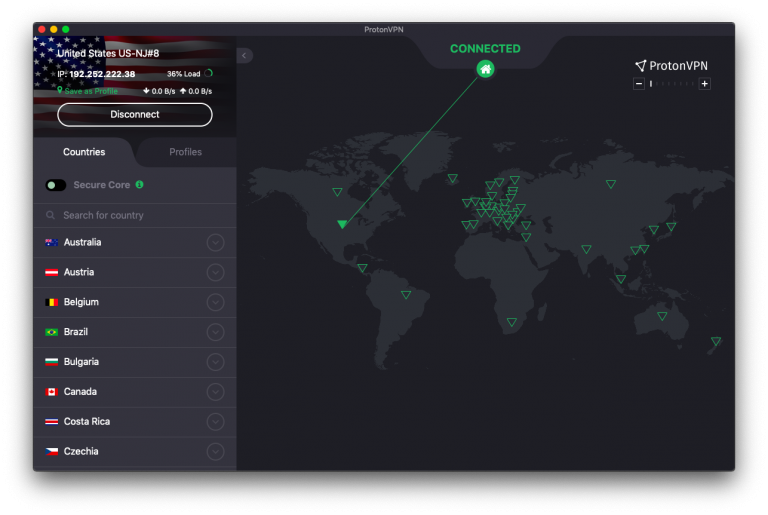

For that the command is: :~$ sudo protonvpn c 5.- Selecting the serverĪnd will show a screen in terminal where we can connect to the server interactively. With this command, you can configure your ProtonVPN credentials and select the plan and the preferred protocol. Then, you have to initialize the client with the following command: :~$ sudo protonvpn init 3.- Initializing ProtonVPN on Debian 10 To use this client, you must first own a ProtonVPN account and choose a plan.
Protonvpn linux install#
:~$ sudo pip3 install protonvpn-cli 2.- Install ProtonVPN on Debian 10 Then, using the tool called PIP, we will be able to install it without problems. To do this, open a terminal and run the following: :~$ sudo apt install openvpn dialog python3-pip python3-setuptools 1.- Install some required packages In addition, installation on Debian 10 is made very easy.įirst, you need to install some necessary dependencies. According to the developers it will allow a better support and maintenance of it. 7 According to its official website, Proton VPN and Proton Mail share the same management team, offices, and technical resources, and are operated from Protons headquarters in Geneva, Switzerland. ProtonVPN has released a new client with terminal interface created in Python. Proton VPN is a VPN service operated by the Swiss company Proton AG, the company behind the email service Proton Mail. Well, with the aim of offering anonymity and privacy to the connections to Internet of our computer is that ProtonVPN is born and we celebrate the arrival of the Linux client written in Python. This is because you need a VPN server that is normally in other countries.

On the other hand, the use of VPN is widespread on the Internet to bypass restrictions by countries or to add a little more security to the connection. This concept allows large corporations to privately share information, files and resources to manage their systems and equipment. Given the deservedly good reputation of ProtonMail, it is not surprising that expectations for ProtonVPN are very high. That is to say, they allow to communicate as if it were a local network but without being physically close. 53.4 Mbps Available on: Works with: Visit ProtonVPN Alternative Choices for You Swiss-based Proton Technologies AG has now also introduced a Virtual Private Network (VPN) service. After installation, I was able to create a connection, use the Internet, etc. I uninstalled v2.2.6 and followed the instructions for installing v3.7.1 on the ProtonVPN website. I was previously using the 2.2.6 version, but I wanted to upgrade, which was a huge mistake. Your description 'from the proton site' is too vague to offer advice. Im using the ProtonVPN Linux CLI client Ubuntu 18.04.
Protonvpn linux software#
First, what is a VPN?Ī VPN (Virtual Private Network) is a technology that allows several computers to communicate on an internal network using the Internet. 1 How you remove software depends upon how you installed it.
Protonvpn linux how to#
So, in this post, you will learn how to install ProtonVPN on Debian 10. Upgrading to a paid account provides access to advanced features, but our core privacy and anti-censorship features are available to all users. Of course, trust in the provider of that VPN is the key to knowing whether or not we should use it.


Using a VPN is a good way to maintain our online safety. That’s it! In order to check whether IPv6 was disabled on your computer, you can do an IPv6 leak test here.Taskset Cheatsheet | Pandoc Cheatsheet | Curl Cheatsheet | Grep CheatSheet | Cron CheatSheet | Grep CheatSheet | More! The following solution should work for most Debian-based distros.ġ) Open Terminal and enter the command: sudo nano /etc/nfĢ) Add all the lines to the bottom of the file and save it: .disable_ipv6 = 1 .disable_ipv6 = 1 .disable_ipv6 = 1 0.disable_ipv6 = 1ģ) Now make the system read the file and confirm the changes using this line: sudo sysctl -p
Protonvpn linux manual#
If using a manual VPN connection, we recommend disabling IPv6. However, it is also possible to manually configure a VPN connection in Linux using the OpenVPN or IKEv2 VPN protocols. We recommend using our official Proton VPN apps on Linux. Both these clients have built-in IPv6 leak protection, with no user configuration required. Proton VPN now offers an official Linux app with graphical user interface and an official Linux CLI.


 0 kommentar(er)
0 kommentar(er)
